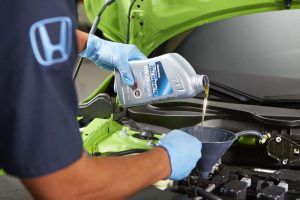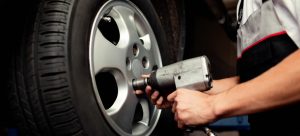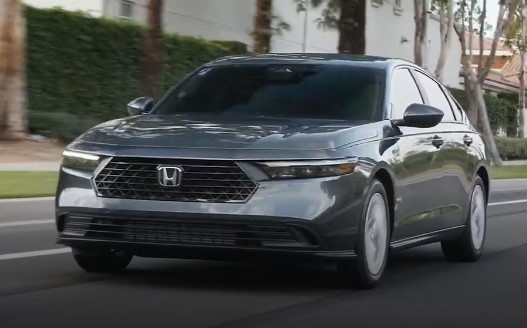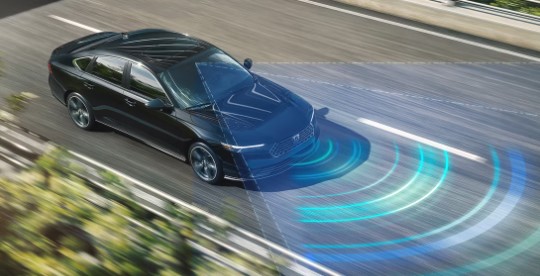

As the spring season unfolds its vibrant colors, you may find yourself planning exciting adventures in your Honda to soak up the warmer weather. But before you hit the road, it's crucial to give your vehicle the TLC it deserves. Paying a visit to our service department near Bristol in Honda Kingsport can ensure that your ride is primed for springtime driving conditions while addressing any wear and tear accumulated over the winter months. Here are five services you should schedule this season.
Prepare for those inevitable April showers by checking the condition of your Honda's windshield wipers. Swing by our service center, and our skilled technicians will evaluate how effectively your wipers clear water and debris from the windshield. If they're showing signs of wear or aren't performing optimally, consider replacing them to maintain clear visibility on the road.

After a season of winter travels, your Honda might be due for an oil change. Schedule a visit to our dealership in Honda Kingsport, and our team will expertly replace the oil and filter under the hood, ensuring your engine continues to purr smoothly. Typically, it's recommended to change your oil every 5,000 to 7,500 miles, so keep that in mind if you're planning any spring road trips.

As the temperatures rise and flowers bloom, it's also an ideal time to schedule a tire rotation. Regularly rotating your Honda's tires ensures even wear across all four tires, leading to a smoother driving experience. After our team inspects your tires, you can hit the road with confidence, knowing your vehicle will handle safely, rain or shine.
Before embarking on any spring adventures, swing by our dealership to ensure your Honda's brakes are in top-notch condition. Our brake repair service involves a thorough inspection and potential repairs or replacements to ensure smooth functionality. From flushing out old brake fluid to checking brake calipers, we'll ensure your vehicle stops safely when you need it to.

When you pull into our service center, our technicians will give your Honda's battery a thorough once-over. Battery maintenance involves checking for leaks, corrosion, and conducting diagnostic tests to catch any potential issues early on. Routine battery inspections will keep your Honda's engine humming along smoothly throughout the season.
Now that you've found the Honda of your dreams, it's essential to keep up with regular maintenance to keep it running smoothly. Our team of experts at Honda Kingsport's service center near Bristol is here to ensure your vehicle stays in top shape, so you can hit the road with confidence and peace of mind. Explore the Honda lifetime warranty options available near you to learn more about coverage for your beloved ride.
When it comes to family-friendly sedans, Honda's 2024 lineup stands out with two outstanding contenders: the 2024 Honda Accord and the 2024 Honda Civic. In this blog, we'll dive into what makes each of these Honda sedans in Kingsport great choices to elevate your commute. Afterwards, shop for your new Honda near Bristol at Honda Kingsport!

Under the hood, both the 2024 Accord and Civic showcase Honda's legendary engineering prowess. The Accord, celebrated for its robust performance, offers a variety of engine options, including a standard 1.5-liter four-cylinder turbo engine that generates 192 lb-ft of torque. Mated with a Continuously Variable Transmission (CVT), the Accord ensures smooth shifts and optimal efficiency.
On the flip side, the 2024 Civic, though slightly more compact, packs a punch with its 1.5-liter four-cylinder turbocharged engine, producing 158 horsepower and 138 lb-ft of torque. Advanced safety features, including Honda Sensing technology, provide an extra layer of security, ensuring peace of mind for drivers and passengers alike. With its reputation for longevity, nimble handling, and low maintenance costs, the 2024 Honda Civic emerges as a practical and stylish choice, embodying the essence of a reliable family sedan.

Size matters, especially when it comes to accommodating families and cargo. The 2024 Accord takes the lead in this category, providing a more spacious interior with ample legroom and a larger trunk capacity. Families with a penchant for road trips and a need for extra cargo space may find the Accord's expansive cabin more appealing.
However, the 2024 Civic, while slightly more compact, doesn't compromise on comfort, offering a well-designed interior with quality materials and clever storage solutions. It boasts a streamlined interior featuring a full-width, honeycomb-patterned mesh dashboard design element and slim air vents. As a 5-seat sedan, the Honda Civic’s 60/40 split fold-down rear seat back folds down to allow for a cargo capacity of up to 24.5 cubic feet, while the trunk area has 14.8 cubic feet of cargo space. The cabin is well-built and handsome, with comfortable seats and an intuitive infotainment system.

In the tech-savvy age we live in, a car's technology features can be a deciding factor for many buyers. The 2024 Accord and Civic both shine in this department, featuring advanced infotainment systems, smartphone integration, and safety technologies. The Accord, being the larger model, comes with an available upgraded 12.3-inch touchscreen infotainment system. This larger display offers a more immersive experience and supports wireless Apple CarPlay and Android Auto integration. The Civic is not far behind, offering a 7.0-inch or optional 9.0-inch touchscreen infotainment system. Wireless Apple CarPlay and Android Auto come standard, allowing seamless smartphone integration. The Touring Hybrid model even includes Google built-in for added convenience.

In this showdown, it's hard to make a wrong choice. The Accord caters to those seeking a spacious and feature-rich sedan, ideal for families with varying needs. Meanwhile, the Civic, with its nimble performance and inviting interior, is a fantastic option for urban dwellers and small families. Ultimately, the choice between these two boils down to individual preferences and the size of your family.
Whether you're on the lookout for a new Honda Civic or a new 2024 Honda Accord in Kingsport, swing by Honda Kingsport, your one-stop-shop for the best new Hondas near Bristol. Our team of experts is ready to assist you however you need. Plus, we have the new Honda financing specials to save you big and our Exclusive Lifetime Warranty that protects you for unlimited time and miles! Find your new Honda sedan near Bristol today!
CATEGORIES
TAGS